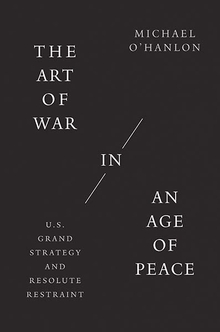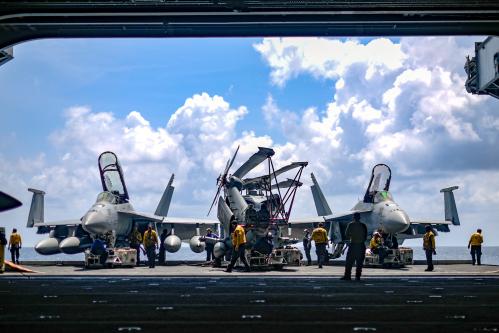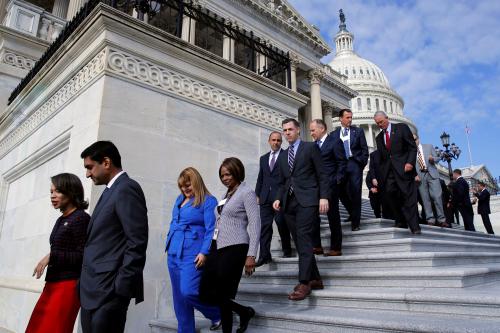Throughout his campaign, President Trump argued for policies that could diminish the global role of the United States, while at the same time indicating that power through strength is a critical part of his defense strategy.
On February 21, the Center for 21st Century Security and Intelligence (21CSI) at Brookings hosted a panel of experts for a discussion on defense recommendations for the Trump administration.
Experts included Thomas Wright, director of the Brookings Project on International Order and Strategy; Robert Hale, former comptroller of the Department of Defense; and Lt. Gen. (retired) Mike Moeller of Pratt & Whitney. Michael O’Hanlon, co-director of 21CSI, moderated the event and joined the discussion.
Number crunching
O’Hanlon reminded the audience that today’s U.S. military budget is around $600 billion per year, including war costs. He also pointed out that the Budget Control Act of 2011 is still in effect, and that the possibility of additional sequestration or government shutdowns still loom.
While O’Hanlon contends that $600 billion is a good reference point, he has also argued that there should be more funding. He specifically advocated for a modest increase in “The $650 Billion Bargain,” published late last year.
President Trump has also argued for a larger military with greater funding. His ideas likely are closer to $700 billion a year, with a roughly 15 percent growth across the services and perhaps more in the Navy.
As a final point of comparison, O’Hanlon stated that an inflation-adjusted average defense budget during the Cold War was about $525 billion.
The big picture
Thomas Wright started by saying that over the past five to six years in particular, “post-Cold War assumptions have come apart.”
What this means, according to Wright, is that in the past we “operated under the assumption that this was the age of convergence, where all powers were moving toward a single international order.” In reality, “the big story of recent years is significant divergence.” In particular, Wright pointed to Russia and China going in different directions as a way to directly balance the United States.
According to Wright, a key challenge for Trump and his national security team will be to determine America’s purpose in this new world. He argued that international institutions do not mater as much as regional orders (adding that many of those regional orders have been in trouble of late), and that the Trump team will need to be cognizant of that.
Wright also pointed out that defense priorities should address specific weaknesses, rather than focusing on dollar totals.
Asked what President Trump should advocate for in terms of defense priorities and what is realistic going forward, Robert Hale mentioned that there will likely be a budget amendment soon—adding that it will probably be substantial, on the order of tens of billions of dollars. As far as priorities go, he said: “I would expect it will follow what Mattis and the president have said. We are likely to see support of European security initiatives…and continued emphasis on special ops [operations] against ISIS.”
One challenge, Hale said, is that any additions to the budget in this fiscal year would violate the Budget Control Act. There are ways around that, he concluded, like emergency funding or changing the law. Both, however, have their own problems, as non-defense agencies contribute significantly to defense, and any changes with penalties at this moment could have adverse impacts on national security.
Ultimately, Hale said, he believes a move toward a major budget deal that considers entitlement spending and revenues is necessary, and that it would broaden the potential in achieving longer-term budget goals.
Retired Lt. Gen. Mike Moeller emphasized that the U.S. military is incredibly ready when it comes to counterterrorism, but is considerably less so on most other operations. He contends this is a big issue, one requiring immediate attention.
Moeller also pointed out that concerns about time for training mingle with concerns about underfunding infrastructure and facilities improvements in recent years. These improvements are costly and time-consuming issues that require attention, he said.
Moeller suggested: “there has to be a cultural change.” While traditional forms of training have worked in the past, we cannot continue to rely on that in the future. Looking to what we should be investing in, Moeller pointed out that Department of Defense budgets generally look out five years. This is a difficult time horizon in several ways, he contended: Beyond five years there can be little idea of what the funding picture will be, and there is inherent uncertainty about what will be needed in even one to two years. Moeller lauded the fact that services are beginning to take a longer view—20 years out in many cases—and then work backwards to come up with one- and five-year plans.
O’Hanlon wondered if the “third offset” (the first focused on nuclear weapons reliance, the second when NATO went high-tech with air-land battle and precision weapons, and the third related to high-tech capabilities and robotics) would be sustained under President Trump. Hale predicted that the wording would change, and it probably would not have the same support as it had in recent years, but that the ideas behind it would remain. Wright agreed that the basis of the third offset should remain part of the thinking, even if the wording is different. The old rules of warfare are not as supreme as they once were. Much of today’s posturing is about provocation and other dilemmas rather than pure military might, he contended.
Given these facts, he concluded, disagreements often protract for years. In this sense in particular, advanced thinking and technology is and will continue to be necessary across the battle space.
The Brookings Institution is committed to quality, independence, and impact.
We are supported by a diverse array of funders. In line with our values and policies, each Brookings publication represents the sole views of its author(s).




![An aerial view of the Pentagon building in Washington, June 15, 2005. [U.S. Defense Secretary Donald Rumsfeld defended the Guantanamo prison against critics who want it closed by saying U.S. taxpayers have a big financial stake in it and no other facility could replace it at a Pentagon briefing on Tuesday.] - RTXNK0I](https://www.brookings.edu/wp-content/uploads/2016/09/pentagon002-e1473173020271.jpg?quality=75&w=500)





Commentary
How Trump should think about defense priorities, according to experts
February 28, 2017